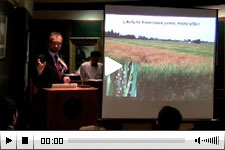Climate Change and Asia's Rice Supply

HONG KONG, February 5, 2010 - The impact of climate change could devastate future rice supplies, cautions Achim Dobermann of the Manila-based International Rice Research Institute (IRRI).
Speaking at the Asia Society Hong Kong Center, the Deputy Director-General for Research at IRRI noted, "I am fairly convinced that climate change is real. Rice supply is vulnerable to it. Scientific solutions exist. Asia needs to provide leadership to the rest of the world. No one eats more rice than Asia."
Sidestepping the larger climate change debate, Dobermann cited a consensus opinion that a rise in temperatures will lead to heat stress, higher sea levels, and more severe weather conditions—and that some farmers, undeniably, stand to gain from these trends. "An increase in temperature will lead to higher yields in some parts. For example, a two-degree Celsius rise in temperatures will likely benefit rice farmers in northern China."
For others though, climate change could be ruinous. "One of the biggest concerns is the rice grown in the delta areas," Dobermann said. "A huge proportion of rice comes from the delta areas. A half-meter increase in sea levels will have a huge impact. There will be more flooding and an intrusion of salt water."
Dobermann warned, "The bottom line is, there are more losers than winners."
Still, the iRRI expert was upbeat about the scientific solutions available to mitigate these problems. He pointed out that with new technologies, rice varieties could conceivably be adapted to tolerate the effects of climate change. Researchers were developing "climate-proof" rice that can withstand drought, salinity, submergence, and heat. Meanwhile, IRRI has taught farmers water-saving irrigation techniques that can cut use by up to 50 percent. The Institute is also looking at converting rice husks into fuel, given that annually about 120 million tons of husk is milled, collected, and burned as waste.
Dobermann noted that rice prices were still twice as high as pre-crisis levels of 2008, when they soared to historically high levels. "The problem is not over," he said. "Any protectionist measures by the government can spread panic. That caused some of the trouble at the peak of rice prices in 2008. This indicates that governments and others are not investing enough to keep food supply where it is needed."
Dobermann urged Asian nations to devote more resources to rice research, as it is the staple for millions of people across the region, and the crop that feeds half the world. "IRRI has been in existence for more than 50 years. More than 50 percent of [its] funding comes from non-Asian donors. I'm German. I don't eat much rice, but I research it. It is time for Asia to play a more significant role. It needs to show interest, investment, and commitment."
Established in 1960, IRRI is the largest agricultural research institute in Asia, and seeks to reduce poverty and hunger, improve the health of rice farmers and consumers, and ensure environmental sustainability.
Reported by Penny Tang, Asia Society Hong Kong Center